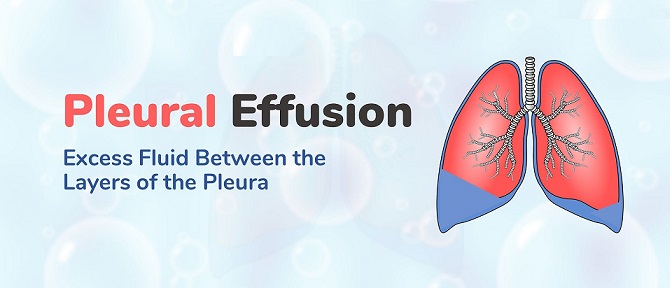- 07-Aug-23
Pleural effusion is a medical term that describes the buildup of extra fluid in the space around the lungs. This space is called the pleural space, and it's like a thin gap between two layers that cover the lungs and the inside of the chest. Normally, a small amount of fluid is there to help the lungs move smoothly when we breathe.
However, when something goes wrong, like an illness or a health condition, too much fluid can gather in this space. This can make it harder for the lungs to expand fully when we breathe, and it might lead to problems like trouble breathing, chest discomfort, or coughing. Doctors can use tests like X-rays or scans to see if there's too much fluid, and they might need to remove it if it's causing problems. Treating the underlying cause is important, and once that's taken care of, the pleural effusion usually gets better.
Pleural Effusion Meaning in Urdu:
پلورل افیوژن: ایک طبی حالت ہے جس میں پھیپھروں کے گرد جگہ میں مائع کی اضافی جمعی ہوتی ہے۔ یہ جگہ پلورل جگہ کہلاتی ہے، اور یہ دو پرتوں کے درمیان کیچڑ کی طرح ہوتی ہے جو پھیپھروں کو ڈھانپتے ہیں اور سینے کے اندر ہوتی ہے۔ عام طور پر، صحیح تنفس کرتے وقت پھیپھروں کو بغیر رکاوٹ کے حرکت دینے کے لئے وہاں کچھ مائع ہوتا ہے۔
Pleural Effusion Symptoms:
Pleural effusion can cause various symptoms, which can vary depending on the amount of fluid buildup and the underlying cause. Common symptoms of pleural effusion include:
- Shortness of Breath: Excess fluid in the pleural space can restrict lung expansion, making it difficult to take deep breaths and leading to a sensation of breathlessness, especially during physical activity.
- Chest Discomfort or Pain: Pleural effusion can cause discomfort or a dull, aching pain in the chest, which may worsen when breathing, coughing, or sneezing.
- Persistent Cough: A chronic or persistent cough may develop, which can be dry or produce mucus. The cough is often worse when lying down.
- Reduced Breath Sounds: Doctors may notice decreased or distant breath sounds while listening to the chest with a stethoscope during a physical examination.
- Fatigue: The body may receive inadequate oxygen due to reduced lung function, leading to feelings of tiredness and fatigue.
- Rapid Breathing (Tachypnea): Due to the limited lung capacity caused by pleural effusion, a person might breathe faster and more shallowly.
- Fever and Chills: If the pleural effusion is caused by an infection, fever, and chills might be present.
It's important to note that these symptoms can also be caused by other medical conditions, so a proper medical evaluation is necessary for accurate diagnosis and appropriate treatment. If you or someone you know is experiencing these symptoms, especially if they are severe or worsening, it's advisable to seek medical attention promptly.
Integrated Medical Care Hospital (IMC Hospital):
IMC Hospital is a well-known and talked about premier hospital in Pakistan. The IMC Hospital may now benefit from the senior, skilled, and experienced medical specialists' years of experience working at some of the most renowned and recognized medical facilities in the world because they are all gathered under one roof. Contact the Integrated Medical Care Hospital (IMC Hospital) to arrange a consultation.

 Map
Map










